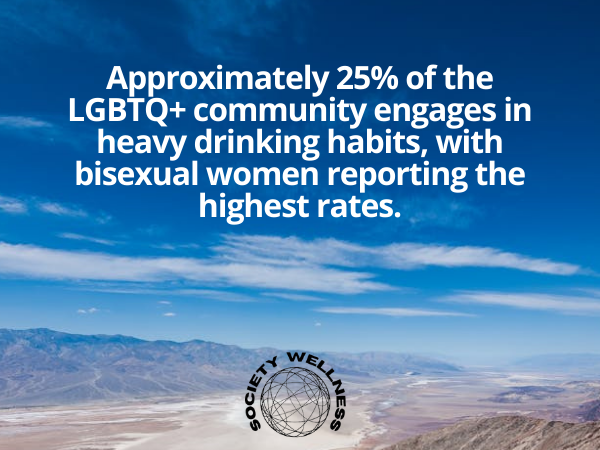Alcohol addiction is often associated with job loss, financial difficulties, or broken relationships, but not all alcoholics fit this stereotype. Many individuals struggling with alcohol use disorder (AUD) continue to maintain their careers, social lives, and responsibilities—these individuals are often referred to as functioning alcoholics.
In the LGBTQ community, functioning alcoholism is a growing concern, as social drinking is heavily ingrained in many LGBTQ spaces, and many individuals use alcohol to cope with discrimination, trauma, and mental health struggles. Even if someone appears to have their life under control, their drinking habits may still be causing serious harm beneath the surface.
This guide explores:
- What it means to be a functioning alcoholic
- How alcohol affects the LGBTQ community
- Signs of high-functioning alcoholism
- The risks of long-term alcohol dependence
- How LGBTQ-specific alcohol addiction treatment can help
If you or a loved one is struggling with alcohol misuse while maintaining daily responsibilities, understanding the reality of high-functioning alcoholism can be the first step toward seeking help.
What Is a Functioning Alcoholic?
A functioning alcoholic is someone who consumes alcohol excessively but continues to perform well at work, maintain relationships, and handle daily tasks. Unlike the common perception of alcoholism, functioning alcoholics don’t always experience immediate life disruptions—but that doesn’t mean their drinking isn’t harmful.
Key Characteristics of Functioning Alcoholism
- Drinking regularly but maintaining work performance
- Hiding or downplaying alcohol consumption
- Using alcohol to cope with stress, anxiety, or trauma
- Experiencing blackouts or memory loss but continuing to drink
- Justifying drinking as a reward or stress relief
- Avoiding conversations about alcohol use
While many functioning alcoholics appear highly successful and in control, their drinking gradually takes a toll on their mental, emotional, and physical health.
Alcohol Use and the LGBTQ Community: A Widespread Issue
The LGBTQ community experiences higher rates of alcohol consumption compared to the general population. This is due to a variety of factors, including:
- Minority stress and discrimination
- Family rejection and social isolation
- Trauma and co-occurring mental health disorders
- The prevalence of alcohol in LGBTQ social spaces
Statistics on Alcohol Use in the LGBTQ Community
- LGBTQ adults are twice as likely to struggle with alcohol use disorder as heterosexual individuals.
- LGBTQ individuals report binge drinking at a rate of 25 percent, compared to 15 percent of the general population.
- Lesbian and bisexual women have a 12 percent higher risk of alcohol dependence compared to heterosexual women.
- Alcohol is commonly used in LGBTQ social settings, making it difficult for individuals to recognize problematic drinking behaviors.
These statistics highlight the need for LGBTQ alcohol addiction treatment programs that address the unique challenges LGBTQ individuals face when struggling with alcohol dependency.
Signs of High-Functioning Alcoholism
Functioning alcoholics often go unnoticed because they maintain their professional and personal responsibilities while drinking excessively. However, over time, their alcohol use becomes increasingly problematic.
Behavioral and Emotional Signs
- Drinking daily or frequently in large amounts
- Using alcohol as a way to relax, cope, or escape stress
- Defensive or dismissive when confronted about drinking habits
- Continuing to drink despite negative consequences
- Drinking alone or hiding alcohol consumption
- Experiencing frequent hangovers but continuing to function
Physical and Mental Health Signs
- Increased tolerance—needing more alcohol to feel the same effects
- Blackouts or memory loss after drinking
- Mood swings, depression, or anxiety
- Changes in sleep patterns and overall health
- Neglecting self-care while prioritizing alcohol consumption
Social and Work-Related Signs
- Drinking before or during work or social events
- Rationalizing drinking as a necessary stress reliever
- Surrounding oneself with others who drink heavily
- Maintaining the appearance of control, despite dependence on alcohol
Recognizing these signs is crucial for early intervention and seeking help before alcohol use leads to serious health or relationship consequences.
The Risks of Long-Term Alcohol Dependence
Even if a functioning alcoholic maintains stability in their daily life, prolonged alcohol use has serious mental, emotional, and physical consequences.
Health Risks of Chronic Alcohol Use
- Increased risk of liver disease, heart disease, and cancer
- Higher likelihood of developing anxiety and depression
- Severe memory loss and cognitive impairment
- Weakened immune system and frequent illnesses
- Increased risk of accidents and injuries due to impaired judgment
Mental Health Implications
Many LGBTQ individuals struggle with co-occurring mental health conditions such as PTSD, depression, or anxiety, which alcohol use only worsens. Over time, this leads to:
- Greater emotional instability
- Increased risk of suicidal thoughts or behaviors
- Reliance on alcohol as a primary coping mechanism
The longer someone delays treatment, the harder it becomes to break free from alcohol dependency. That’s why seeking help early through LGBTQ addiction treatment programs can make a life-changing difference.

How LGBTQ Alcohol Addiction Treatment Programs Help
LGBTQ rehab centers provide a safe, affirming space where individuals can recover without fear of judgment or discrimination.
1. LGBTQ Partial Hospitalization Program (PHP)
- Best for individuals needing full-time treatment for alcohol addiction.
- Includes daily therapy and counseling sessions.
- Detox support and medical stabilization.
- LGBTQ-affirming group therapy to address identity-related struggles.
2. LGBTQ Intensive Outpatient Program (IOP)
- Best for individuals who need structured support while maintaining daily responsibilities.
- Includes several therapy sessions per week.
- Relapse prevention strategies and sober coping mechanisms.
- Support for co-occurring mental health conditions.
3. LGBTQ Evening Outpatient Treatment Program
- Best for individuals who want to continue recovery while working or studying.
- Includes evening therapy sessions for accessibility.
- Community support and peer accountability.
- LGBTQ-friendly relapse prevention strategies.
4. LGBTQ Alcohol Addiction Treatment Program
- Best for LGBTQ individuals struggling with long-term alcohol dependence.
- Includes individualized treatment plans tailored to each person’s needs.
- Trauma-informed therapy for underlying emotional wounds.
- 12-step and non-12-step recovery approaches that affirm LGBTQ identities.
These specialized treatment programs address the unique struggles of LGBTQ individuals in addiction recovery, offering compassionate, affirming care to help individuals achieve lasting sobriety.
Conclusion
Just because someone can function while drinking doesn’t mean their alcohol use isn’t a problem. High-functioning alcoholism is dangerous because it often goes unnoticed, allowing the individual to hide their struggles while their health and well-being deteriorate.
If you or a loved one is struggling with alcohol misuse but maintaining responsibilities, now is the time to seek help. Recovery is possible, and support is available in LGBTQ addiction treatment programs.
Call LGBTQ Behavioral Health today at 888.964.8116 to start your journey toward lasting sobriety, emotional healing, and a healthier future.
FAQ on High-Functioning Alcoholism
What is a functioning alcoholic?
A functioning alcoholic is someone who consumes alcohol excessively while maintaining work, relationships, and responsibilities. Unlike the stereotypical image of addiction, they appear to have control over their lives, but their drinking gradually impacts their mental, physical, and emotional health.
Why is alcoholism more common in the LGBTQ community?
LGBTQ individuals face higher rates of alcohol use disorder (AUD) due to:
- Minority stress and discrimination
- Family rejection and social isolation
- Trauma and co-occurring mental health disorders
- Alcohol’s prevalence in LGBTQ social spaces
How can I tell if I or someone I love is a high-functioning alcoholic?
Some common signs include:
- Drinking regularly but hiding alcohol use
- Using alcohol as a coping mechanism for stress, anxiety, or trauma
- Experiencing memory blackouts or needing more alcohol to feel the same effects
- Defensiveness when confronted about drinking habits
- Continuing to drink despite negative consequences
What are the risks of functioning alcoholism?
While functioning alcoholics may not immediately experience severe consequences, long-term drinking can lead to:
- Increased risk of liver disease, heart disease, and mental health decline
- Higher likelihood of depression and suicidal thoughts
- Increased dependency on alcohol for coping with emotions
- Relationship and career struggles as alcohol use escalates
What LGBTQ-specific addiction treatment options are available?
LGBTQ-specific alcohol addiction treatment programs include:
- LGBTQ Partial Hospitalization Programs (PHP) for intensive daily treatment.
- LGBTQ Intensive Outpatient Programs (IOP) for flexible recovery support.
- LGBTQ Evening Outpatient Treatment Programs for continued recovery while maintaining responsibilities.
- LGBTQ Alcohol Addiction Treatment Programs tailored to identity-specific challenges.
How can I seek help for high-functioning alcoholism in the LGBTQ community?
The first step is acknowledging the problem and reaching out for professional support. LGBTQ-affirming treatment centers provide safe, inclusive, and trauma-informed care.

